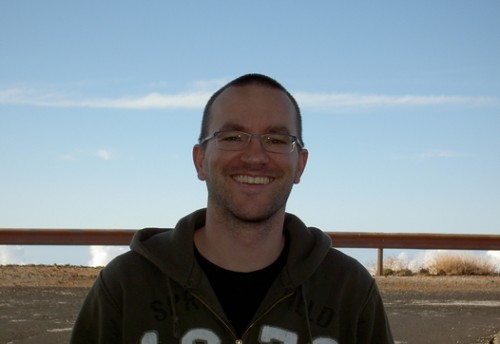- Date: 24 Mar 2017
- Comments: (0)
- Categories: For Everyone, Human Interest
Get to Know Gemini is a new series of blog posts aimed to highlight the different careers, backgrounds, and types of people contributing to Gemini Observatory and its science.
Name: Mischa Schirmer
What is your current position and at which telescope?
I’m an assistant scientist at Gemini South.
In four lines or less, explain what you do as part of the Gemini Observatory team?
I spend about 20 nights per year as a night-time observer, executing the observing plans and doing an initial quality assessment. At other times I prepare the observing plans, oversee the progress of our programs, help our users, maintain and develop software tools, and keep a watchful eye at our instrumentation.
How long have you worked for Gemini?
A bit more than 5 years.
What drew you to this job?
It is a very interdisciplinary job. I love all aspects of observational astronomy, and the best place to be is at a large observatory. There, everything comes together. Researchers submit their observing programs to us, we help them optimize the setup, get the data for them, and provide post-observation support. I find this very rewarding because I help other people explore the Universe in the best possible manner… and I like that I can contribute much more to our understanding of the Universe than through my own research projects alone (which I like very much, nonetheless).
What is the best part of your job?
It’s always exciting. I see research unfold long before it gets published, and I can help it along the way with my technical and scientific experience. I often see that my work makes a difference to others, and that is very rewarding and motivating.
Where are you originally from/where did you grow up?
I was born and grew up in southern Germany, near Munich.
What skill do you think is most important to know for your job?
That’s a good one. At first I wanted to say “technical and scientific experience”. But the real answer, I think, is curiosity. The best scientists are curious. Because curiosity makes you want to understand how things work, find ways to improve and fix them, and explore new ways forward. That applies to all aspects of my job. The skills, and the technical and scientific experience then come automatically.
Why is astronomy important?
Because astronomy tells us that we don’t need to worry that the Sun will extinguish tomorrow and life on Earth will uncomfortably quickly freeze to death. Because conservation of angular momentum tells us that the sun will rise again tomorrow. Because space begins just 100km above our heads (many people commute more than that), and it is a much thinner layer of thin air that protects us from the deadly vacuum and the radiation out there. When you think about it… it’s scary! Astronomers and the laws of physics tell you not to worry, we checked!
We are taking many things for granted, because they seem “natural”, but they are not. To most of us, the Universe is far away and unimportant. That is not true. All protons, neutrons and electrons in your body were formed in a hot beginning 13 billion years ago; stars fused them into larger nuclei such as carbon and oxygen, without which our metabolisms would not work, and we would suffocate in minutes. The gold in your wedding ring and in the circuitry of your computer was forged by the violent death of a giant star that lived before the Sun came into existence. Some of the very same atoms in your body were perhaps once part of a fearsome Tyrannosaurus Rex, it’s eyes, it’s claws, or perhaps it’s teeth? Ultimately, astrophysicists strive to understand where the Universe came from, and how it managed to grow stars and planets capable of supporting life. It gives meaning to everything, it provides the big context.
In three lines, explain your PhD thesis.
My PhD was focused on finding the most massive structures in the Universe, clusters of galaxies. Because clusters are so massive, they optically distort the images of distant background galaxies. I have developed a method based on this lensing effect to identify clusters.
What are your current research interests?
I study supermassive black holes in the centers of galaxies, and how they grow over time. Even though these black holes are tiny compared to a galaxy, they can release enormous amounts of energy, severely messing things up. For example, they may shut down a galaxy’s capability to form stars such as our Sun. There is a very large number of open questions in this area that will keep astronomers busy for decades to come.
What is your favorite movie?
I don’t have one.
What is the latest book you have read?
“The Cavemen”, from Joern Lier Horst. Horst worked as a crime investigator for the Norwegian police before he became a writer. His crime stories are excellent page turners.
What three albums would you bring with you to a desert island?
None. I’d enjoy the nature, peace, and spend all day snorkeling and scuba diving until the nitrogen levels in my body tissues reach critical values.
What is one hobby of yours?
Observing and taking pictures of the night sky with my self-made telescope. Unfortunately, it’s locked up far away because I could not bring it along when we moved to Chile.
Check back next month to learn more about the staff that help Gemini to explore the Universe and share its wonders!






